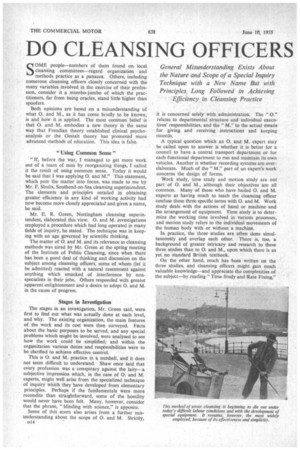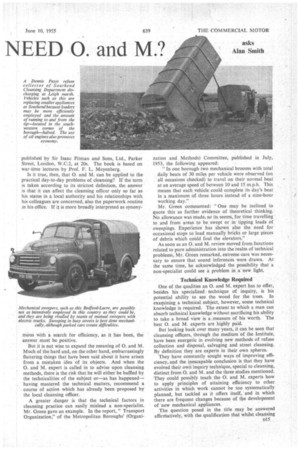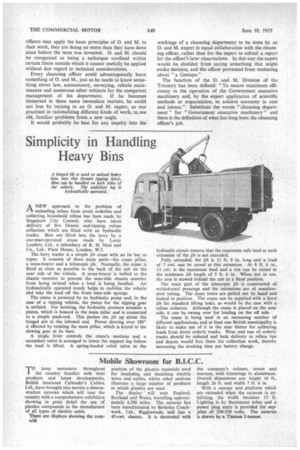DO CLEANSING OFFICERS
Page 72

Page 73

Page 74

If you've noticed an error in this article please click here to report it so we can fix it.
NEED 0. and M.?
General Misunderstanding Exists About the Nature and Scope of a Special inquiry Technique with a New Name But with Principles. Long Followed in Achieving Efficiency in Cleansing Practice
SOME people—numbers of them found on local cleansing committees—regard organization and methods practice as a panacea. Others, including numerous cleansing officers closely concerned with the many variables involved in the exercise of their profession, consider it a mumbo-jumbo of which the practitioners, far from being oracles, stand little higher than spoof ers.
Both opinions are based on a misunderstanding of what 0. and M., as it has come briefly to be known, is and how it is applied. The most common belief is that 0. and M. embodies a new theory in the same way that Freudian theory established clinical psychoanalysis or the Gestalt theory has promoted more advanced methods of education. This idea is false.
"Using Common Sense" "If. before the war, I managed to get more work out of a team of men by reorganizing things, I called it the result of using common sense. Today it would be said that I was applying 0. and M." This statement, which puts the matter into focus, was made to me by Mr. F. Shults, Southend-on-Sea cleansing superintendent. The elements and principles entailed in obtaining greater efficiency in any kind of working activity had now become more closely appreciated and given a name, he said.
Mr. E. R. Green, Nottingham cleansing superintendent, elaborated this view. 0. and M. investigations employed a procedure which had long operated in many fields of inquiry, he stated. The technique was in keeping with an age governed by scientific thinking.
The matter of 0. and M. and its relevance to cleansing methods was aired by Mr. Green at the spring meeting of the Institute of Mille Cleansing, since when there has been a good deal of thinking and discussion on the subject among cleansing officers, some of whom (let it be admitted) reacted with a natural resentment against anything which smacked of interference by nonspecialists in their jobs. Others responded with greater apparent enlightenment and a desire to adopt 0. and M. in the cause of progress.
Stages in Investigation
The stages in an investigation, Mr. Green said, were first to find out what was actually done at each level, and why. The existing organization, the main features of the work and its cost were then surveyed. Facts about the basic purposes to be served, and any special problems which might be involved, were analysed to see how the work could be simplified; and within the organization various duties and respbnsibilities were to be clarified to achieve effective control.
This is 0. and M. practice in a nutshell, and it does not seem difficult to understand. Shaw once said that every profession was a conspiracy against the laity—a subjective impression which, in the case of 0. and M. experts, might well arise from the specialized technique of inquiry which they have developed from elementary principles. Perhaps if the fundamentals were more recondite than straightforward, some of the hostility would never have been felt. Many, however, consider that the phrase, "blinding with science," is apposite.
Some of this scorn also arises from a further misunderstanding about the scope of 0. and M. Strictly, it is concerned solely with administration. The "0." relates to departmental structure and individual executives' responsibilities, and the "M." to the actual means for giving and receiving instructions and keeping records.
A typical question which an 0. and M. expert may be called upon to answer is whether it is better for a council to have a central transport department or for each functional department to run and maintain its own vehicles. Another is whether recording systems are overelaborate. Much of the " M." part of an expert's work concerns the design of forms.
Work study, time study and motion study are not part of 0. and M., although their objectives are all common. Many of those who have hailed 0. and M. experts as having much to teach the cleansing officer confuse these three specific terms with 0. and M. Work study deals with the actions of hand or machine and the arrangement of equipment. Time study is to determine the working time involved in various processes, and motion study refers to the individual movements of the human body with or without a machine.
In practice, the three studies are often done simultaneously and overlap each other. There is, too, a background of greater intricacy and research to these three studies than to 0. and M., upon which there is as yet no standard British textbook.
On the other hand, much has been written on the three studies, and cleansing officers might gain much valuable knowledge—and appreciate the complexities of the subject—by reading "Time Study and Rate Fixing," published by Sir Isaac Pitman and Sons, Ltd., Parker Street, London, W.C.2, at 20s. The book is based on war-time lectures by Prof. F. L. Meyenberg.
Is it true, then, that 0. and M. can be applied to the practical day-to-day problems of cleansing? If the term is taken according to its strictest definition, the answer is -that it can affect the cleansing officer only so far as his status in a local authority and his relationships with his colleagues are concerned, also the paperwork routine in his office. If i/ is more broadly interpreted as synony mous with a search for efficiency, as it has been, the answer must be positive.
But it is not wise to expand the meaning of 0. and M. Much of the hard and, on the other hand, embarrassingly flattering things that have been said about it have arisen from a mistaken idea of its objects. And when the 0. and M. expert is called in to advise upon cleansing methods, there is the risk that he will either be baffled by the technicalities of the subject or—as has happened— having mastered the technical matters, recommend a course of action which has already been proposed by the local cleansing officer.
A greater danger is that the technical factors in cleansing practice can easily mislead a non-specialist. Mr. Green gave an example. In the report," Transport Organization," of the Metropolitan Boroughs' (Organi
zation and Methods) Committee, published in July, 1953, the following appeared: "In one borough two mechanical brooms with total daily beats of 30 miles per vehicle were observed (on all occasions checked) to travel on their normal beat at an average speed of between 10 and 15 m.p.h. This means that each vehicle could complete its day's beat in a maximum of three hours instead of a nine-hour working day."
Mr. Green commented: "One may be inclined to quote this as further evidence of theoretical thinking. No allowance was made; so its seems, for time travelling to and from areas to be swept or in tipping loads of sweepings. Experience has shown also the need for occasional stops to load manually bricks or large pieces of debris which could foul the elevators."
As soon as an 0. and M. review moved from functions related to pure administration into the realm of technical problems, Mr. Green remarked, extreme care was necessary to ensure that sound inferences were drawn. Atthe same time, he acknowledged the possibility that a non-specialist could see a problem in anew light.
Technical Knowledge Required
One of the qualities an 0. and M. expert has to offer, besides his specialized technique of inquiry, is his potential ability to see the wood for the trees. In examining a technical subject, however, some technical knowledge is required. The extent to which a man can absorb technical knowledge without sacrificing his ability to take a broad view is a measure of his worth. The best 0. and M. experts are highly paid.
But looking back over many years, it can be seen that cleansing officers, through the medium of the Institute, have been energetic in evolving new methods of refuse collection and disposal, salvaging and street cleansing. By definition they are experts in their own spheres. They have constantly sought ways of improving efficiency, and the inescapable conclusion is that they have evolved their own inquiry technique, special to cleansing, distinct from 0. and M. and the three studies mentioned. They could possibly teach the 0. and M. experts how to apply principles of attaining efficiency to other activities in which work cannot be too systematically planned, but tackled as it offers itself, and in which there are frequent changes because of the development of new mechanical appliances. The question posed in the title may be answered affirmatively, with the qualification that whilst cleansing n15 officers may apply the basic principles of 0. and M. to their work, they are doing no more than they have done since before the term was invented. 0. and M. should be recognized as being a technique confined within certain limits outside which it cannot usefully be applied without due regard to technical considerations.
Every cleansing officer could advantageously learn something of 0. and M., just as he needs to know something about law, accountancy, surveying, vehicle maintenance and numerous other subjects for the competent management of his department. If he becomes immersed in these more immediate matters, he could not lose by turning to an 0. and M. expert, as one practised in rationalizing different kinds of work, to.see old, familiar problems from a new angle.
It would probably be best for any inquiry into the workings of a cleansing department to be done by an 0. and M. expert in equal collaboration with the cleans ing officer, rather than for the expert to submit a report for the officer's later observations. In this way the expert would be shielded from saying something that might evoke derision, and the officer prevented from muttering about "a Gestapo."
The function of the 0. and M. Division of the Treasury has been defined: "To secure maximum efficiency in the operation of the Government executive machinery and, by the expert application of scientific methods or organization, to achieve economy in cost and labour." Substitute the words "cleansing department" for "Government executive machinery" and there is the definition of what has long been the cleansing officer's job.




























































































































































